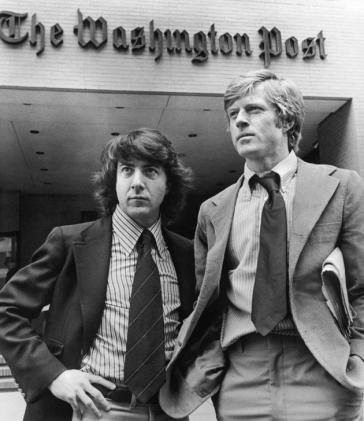Thursday, April 8, 1976
ALL THE PRESIDENT'S MEN. Written by William Goldman, based on the book by Bob Woodward and Carl Bernstein. Music by David Shire. Directed by Alan J. Pakula. Classifier's warning: occasional coarse language. Mature entertainment.RIDDLE: WHAT'S THE difference between a newspaper reporter and the president of the United States?
Answer: The president is required to take an oath.
Twice in his life, Richard Milhous Nixon has stood before the Chief Justice of the Supreme Court and spoken the 35 words prescribed by Article lI, Section I of the U.S. Constitution.
"I, Richard Nixon, do solemnly swear that I will faithfully execute the office of President of the United States and will, to the best of my ability, preserve, protect and defend the Constitution of the United States."
In the concluding minutes of All the President's Men, the former president is seen repeating those words, a florid face on a portable television sitting in the newsroom of The Washington Post. In the background, ignoring him in his moment of triumph, are two reporters. They are furiously hammering away at their typewriters and, to anyone who hasn't been shut away in a Tibetan monastery for the last five years, the meaning of director Alan J. Pakula's penultimate image is perfectly clear.
As a film, All the President’s Men is the five-star final. It is a civics lesson, an historical chronicle, an incredible adventure story, a breathless thriller and a thoroughly satisfying entertainment.
A true story, it began (and the film begins) on June 17, 1972. Bob Woodward, a Post metropolitan reporter, was assigned to cover the arraignment of five men arrested in the early hours of the morning in an attempted burglary of the headquarters of the Democratic National Committee in Washington's Watergate office complex.
The story was bigger than anybody imagined. Teamed with reporter Carl Bernstein and backed to the hilt by their newspaper's executive editor, Ben Bradlee, Woodward pieced together a dramatic and shocking story that ultimately led to the resignation of Nixon and the succession of Representative Gerald R. Ford to the presidency.
A great story, it was chronicled by Woodward and Bernstein in their book, All the President's Men. Actor Redford thought that it would make a great picture.
He was right.
In the group art that is motion pictures, it is rare for absolutely everything to come together perfectly. Here it does. Redford, fresh from such socially-conscious projects as the Candidate (1972) and Three Days of the Condor (1975), signed on to play the cautious Woodward. Dustin Hoffman, who sought purpose as The Graduate (1967) and freedom for the word as Lenny (1974), was just right for the chain-smoking Bernstein.
Director Pakula, responsible for the atmospheric mystery Klute (1971), recently completed The Parallax View (1974), the tense story of an investigative reporter who runs afoul of a deadly political conspiracy. With Redford and William Goldman, the writer who saw to it that Butch Cassidy and the Sundance Kid (1969) had something to say, he plotted a successful strategy for the most challenging assignment of any of their careers.
They have approached their material with responsibity and restraint. The story, a tightening noose of guilt that ultimately choked the life out of the Nixon presidency, has plenty of drama all on its own, A low-key, almost-documentary presentation counterpoints the built-in tension and suspense.
The film, like the investigation itself, has to deal with a mountain of material and an ever-expanding cast of characters. It shows us how the reporters assembled the first pieces and sits with them as they try to assemble them into a story. Soon it becomes apparent that they have set the fuse on a political time-bomb.
Constantly against deadline, continually surprised by the dimensions of the case, Woodward and Bernstein are powered by a combination of adrenalin, professional prlde and something metropolitan editor Harry Rosenfeld (Jack Warden) calls "hunger."
Luck, tenacity and the confidential guidance of a source known only as "Deep Throat" (Hal Holbrook) sets them on the right track. As the story unfolds, a dozen mini-dramas work themselves out.
On the managerial level, Bradlee (Jason Robards) comes under increasing pressure to end an investigation that has generated little public interest but has been deepening the animosity between the press and the administrerion.
On a personal level, reporter Sally Aiken (Penny Fuller) must tear open old emotional wounds to add vital pieces to the puzzle. In playing the role, Fuller suggests that Aiken instinctively understands the importance of the story. Bradlee puts it more colourfully: "Nothing's riding on this except the First Amendment, freedom of the press and the future of the country."
Watergate challenged the free press and produced one of journalism's finest hours. All the President's Men insures that its lessons will be understood and remembered.
The above is a restored version of a Province review by Michael Walsh originally published in 1976. For additional information on this archived material, please visit my FAQ.
Afterword: In retrospect, I may have been a little too hasty (and a lot too hopeful) declaring that Pakula's film would insure that the lessons of Watergate "will be understood and remembered." Thirty-seven years later, the kind of newspaper journalism All the President's Men celebrated is in ruins. The newspaper business model has failed to adapt itself to new media realities, and seems to be going the way of the downtown department store and video-cassette tapes as vulture-like hedge-fund managers swoop down to feast on its bones. In the case of The Washington Post, ironies abound. Two months ago (August 5, 2013), new media billionaire and Amazon.com founder Jeff Bezos bought the 135-year old company and all its assets. Good news or bad? That story has yet to be written.
See also: A month after the film's release, I had the opportunity to interview director Alan J. Pakula during a break at Seattle's Motion Picture Seminar of the Northwest.
